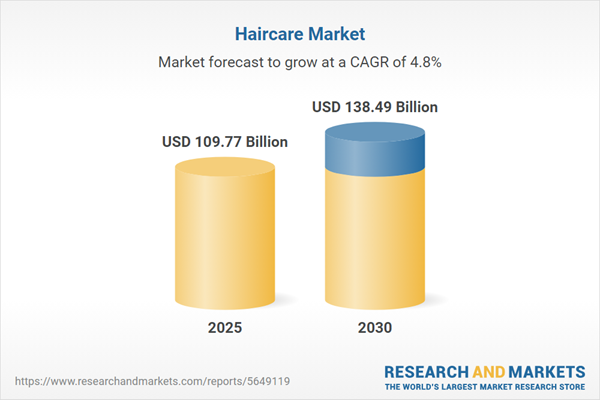Haircare is an overall term denoting the varied range of products and practices used to maintain hair hygiene, including scalp & hair cleansing; hair health, such as conditioning or nourishing the hair and protecting the hair; and hair beauty treatment, such as coloring, styling, etc.
The growing middle-class population and increasing urbanization are the major factors that are boosting the demand for hair care products. With rising awareness about personal hygiene and a focus on aesthetic appeal, consumers are increasingly opting for different hair care products, as haircare products are used to groom hair and get an aesthetic hairstyle while managing various hair problems such as hair fall, dandruff, frizzy hair, split ends, and dry or itchy scalp. The rising level of air pollution and the increasing temperature are also harming the quality of hair, encouraging people to use hair care products to protect them from the harmful impact of these environmental factors.
Hair aesthetics has also led to a rise in the number of consumers opting for hairstyle chemical treatments, including dyeing and straightening. Since chemically treated hair requires premium hair care products to maintain the health and texture of hair, the demand for premium hair care products is increasing significantly, thereby fueling the overall haircare market growth. The rising use of social media is driving consumers to explore various global haircare brands, thereby spurring the global haircare market's growth.
Global Haircare Market Drivers
Increasing awareness of hair health is propelling the haircare market
There is growing consumer awareness of hair care amidst the damage done by pollution to hair health. Environmental degradation, such as increasing air pollution, water pollution, and fertilizer-based foods, has greatly damaged hair and its quality. Hair fall and hair breakages are a widespread issue now. As such, consumers' consciousness about their hair health is rising. The rise of social media has also greatly impacted consumers' consciousness about their hair health. Thus, in the last few years, there has been a great rise in the demand for haircare products for tackling various hair-related issues such as dry scalp, itchy scalp, hair fall, hair breakage, etc. Consumers are demanding Shampoos, conditioners, serums, and hydrating hair masks for their hair health.Geographical Outlook of the Global Haircare Market:
Asia-Pacific will be the fastest-growing market
Geographically, the global night cream market has been segmented into North America, South America, Europe, the Middle East, Africa, and Asia-Pacific.The Asia-Pacific market for hair care is poised to grow at a substantial CAGR during the forecast period. Rising awareness about various hair care products in countries like China, India, and Australia, coupled with the presence of major market players, is boosting the demand for hair care products. Increasing disposable incomes and living standards are also augmenting the demand for premium hair care products. The booming e-commerce industry is also supporting the rising sales of international hair care products, thus positively impacting the regional market growth. North America and Europe also hold significant market shares owing to the high demand for professional hair care services in these regions.
Reasons for buying this report:
- Insightful Analysis: Gain detailed market insights covering major as well as emerging geographical regions, focusing on customer segments, government policies and socio-economic factors, consumer preferences, industry verticals, other sub-segments.
- Competitive Landscape: Understand the strategic maneuvers employed by key players globally to understand possible market penetration with the correct strategy.
- Market Drivers & Future Trends: Explore the dynamic factors and pivotal market trends and how they will shape up future market developments.
- Actionable Recommendations: Utilize the insights to exercise strategic decision to uncover new business streams and revenues in a dynamic environment.
- Caters to a Wide Audience: Beneficial and cost-effective for startups, research institutions, consultants, SMEs, and large enterprises.
What do businesses use our reports for?
Industry and Market Insights, Opportunity Assessment, Product Demand Forecasting, Market Entry Strategy, Geographical Expansion, Capital Investment Decisions, Regulatory Framework & Implications, New Product Development, Competitive IntelligenceReport Coverage:
- Historical data & forecasts from 2022 to 2030
- Growth Opportunities, Challenges, Supply Chain Outlook, Regulatory Framework, Customer Behaviour, and Trend Analysis
- Competitive Positioning, Strategies, and Market Share Analysis
- Revenue Growth and Forecast Assessment of segments and regions including countries
- Company Profiling (Strategies, Products, Financial Information, and Key Developments among others)
The Global Haircare Market is segmented and analyzed as follows:
By Product
- Shampoo & Conditioner
- Hair Color
- Hair Oil
- Hair Mask
- Others
By Application
- Household
- Professional
By End-User
- Men
- Women
By Sales Channel
- Online
- Offline
By Geography
- North America
- South America
- Europe
- Middle East and Africa
- Asia-Pacific
Table of Contents
Companies Mentioned
- Unilever
- Henkel AG & Co. KGaA
- Procter & Gamble
- Kao Corporation
- L’OREAL GROUP
- VEDA CORP.
- Amway
- Johnson & Johnson Services, Inc.
- Marico
- Shiseido Co., Ltd.
Table Information
| Report Attribute | Details |
|---|---|
| No. of Pages | 152 |
| Published | December 2024 |
| Forecast Period | 2025 - 2030 |
| Estimated Market Value ( USD | $ 109.77 Billion |
| Forecasted Market Value ( USD | $ 138.49 Billion |
| Compound Annual Growth Rate | 4.7% |
| Regions Covered | Global |
| No. of Companies Mentioned | 10 |









